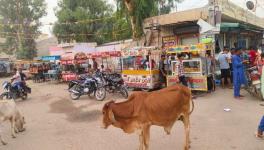Farm Laws: ‘Had it Sensed its Duty, the Government Would have Talked’
Perhaps it was the heat that forced all the men here to wear white; a blazing sun shines overhead. Tikooram Jat listens carefully to the speakers making speeches from the main stage erected at one end of the local Agricultural Produce Marketing Committee (APMC), commonly known as mandi, in Rajasthan’s Sikar. Packed with about 15,000 farmers from the district, the mahapanchayat on February 23 was considered one of the largest congregations of farmers in the Shekhawati region against the Farm Laws.
Jat has travelled about 35 kms to attend the mahapanchayat against the recently-enacted Farm Laws called for by the Samyukta Kisan Morcha (SKM).
Farmers from the semi-arid region have long been struggling for water availability and a minimum support price (MSP). It is ironic that they had chosen the mandi for their protest, a site where government apathy and the traders’ brazenness deprived them of just incomes for long. Speaking to Newsclick, Jat explained the ordeal around selling produce. “The decision to purchase our produce entirely depends on the officer’s mood. First we are called to the mandi along with our produce. Once we pile it up we are told that they will only buy ten quintals. The rest of the produce goes to private traders. Even if it ends up being procured we are paid after three to four months. The large numbers of farmers you see here are only because we are enraged,” he explains.
When asked if the current situation has affected him financially, Jat said that the farmers have been suffering due to another kind of tragedy, one that has especially affected their children. “Today we have only two choices – either be debt-ridden and educate your children or keep them illiterate. Our children are dropping out because we do not have money to make hefty payments. My child needs to travel 35 kms to reach his college. How would he study if we do not have money? Agriculture has been supporting our households; it is about existence and the government will have to repeal the laws,” he added.
A conversation with the farmers from the region suggests that they have begun to gauge the implications of the Farm Laws. Another farmer who sits beside Jat told Newsclick that private agri-based companies would primarily benefit from the contentious laws.
“It is a blatant lie that farmers could not sell their produce anywhere in the country earlier. The first law (Farmers’ Produce Trade and Commerce (Promotion and Facilitation) Act) actually gives freedom to companies to trade anywhere in the country. Similarly, the contract farming act (Farmers’ Empowerment and Protection Agreement on Price Assurance and Farm Services Act) binds the farmers but liberates traders to procure produce just on the basis of an Aadhaar card. Where is the guarantee that a trader will not flee without paying up. Forgeries have already started to take place,” he says, adding that the farmers who spend about Rs 2,000 per quintal to produce pearl millet had to sell their produce at Rs 1,100 per quintal.
However, water scarcity and the Ashok Gehlot-led Rajasthan government’s apathy soon dominates the conversation. Muralidhar, who has travelled from Shri Madhopur Tehsil to attend the mahapanchayat says the farmers are pawns in a power game between the Congress and BJP. “First Modiji promised that he would bring us water. It is now hard for us to find drinking water let alone that for farming and other household chores. We believed him and elected this good-for-nothing babaji (Sumedhanand Saraswati) as our MP, a politician who would not have won in his lifetime. Ashok Gehlot promised our loans would be waived off. Nothing of the sort happened, we were cheated. Now, banks, co-operatives and money lenders are fleecing us for money. No day passes when one does not find a news report of a farmer suicide. This mahapanchayat also exemplifies the fact that the farmers are not willing to succumb to threats by banks or to hunger. We would rather die struggling,” he adds.
Sitaram Pawanda, an advocate, maintains that the present crisis, which is being seen as a calamity by the urban population, will largely affect rural folk who would suffer the most. “If agriculture comes under the control of these companies people living in rural areas will be hit most. A farmers cannot grow everything on his own. He needs essentials like salt, oil, rice and cereals. Agriculture has been supporting us through all this. It gave us money to feed our children, send them to schools and take care of the elderly. This would all become impossible,” he says.
Pawanda’s voice suddenly takes on a higher tone when he talks of banks. “They hire men to humiliate farmers by beating drums in front of their houses, even when he has mortgaged his land to you. However, you do not have any issue with millionaires refusing to pay back even when they are financially sound and get loans merely on the basis of transactions,” he adds.
A quiet Manoj, who sits calmly right at the end of the mandi, says: “You see democracy in many forms. One is being practiced here when farmers raise their voices peacefully. Had the government sensed its duty, it would have talked.”
Get the latest reports & analysis with people's perspective on Protests, movements & deep analytical videos, discussions of the current affairs in your Telegram app. Subscribe to NewsClick's Telegram channel & get Real-Time updates on stories, as they get published on our website.
























